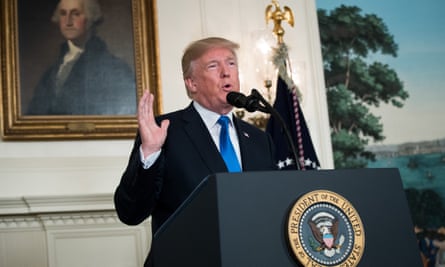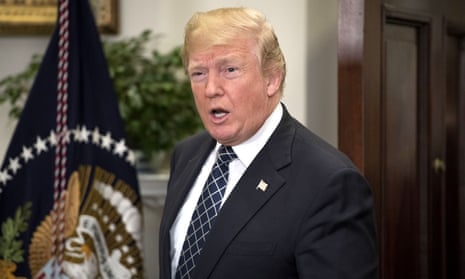Donald Trump has waived a raft of sanctions against Iran as required under a 2015 nuclear agreement, staying within the deal for the time being, but the US president warned European allies and Congress it will be the last such waiver he signs if they fail to agree to radical changes.
With his announcement, the president in effect began a four-month countdown until the US ceases to comply with its obligations under the agreement. The next sanctions waivers fall due on 12 May. The president laid down conditions for signing those that former diplomats involved negotiating the deal said were all but impossible to meet.
Q&AWhy is Trump hostile to Iran?
Show
The genesis of Trump’s particular antipathy to Iran is hard to pin down. Before entering office he had been sceptical of Iran’s regional rival, Saudi Arabia. But during the 2016 election campaign all his closest foreign policy advisors, such as Michael Flynn, shared a worldview that portrays Iran as an uniquely malign actor in the Middle East and beyond. After the election, Israel, Saudi Arabia and the United Arab Emirates were successful in capturing the ear of Trump and his son-in-law and top adviser Jared Kushner.
Trump said he would work with Congress to amend legislation governing US participation in the agreement, the Joint Comprehensive Plan of Action (JCPOA), but the outcome would have to include immediate access to all sites by international weapons inspectors and the indefinite extension of limits on Iran’s uranium enrichment and other nuclear activities, which have expiration dates under “sunset clauses” in the JCPOA.
Such changes would represent a contravention of the agreement, reached after two years of negotiations in Vienna in July 2015, but Trump declared on Friday: “If Iran does not comply with any of these provisions, American nuclear sanctions would automatically resume.”
Trump said that Europe would also have to agree to changes in the deal. In forceful language aimed primarily at the UK, German and France, who were co-signatories of the agreement, Trump said: “This is a last chance ... I hereby call on key European countries to join with the United States in fixing significant flaws in the deal, countering Iranian aggression, and supporting the Iranian people. If other nations fail to act during this time, I will terminate our deal with Iran.”
A White House official said that Trump wanted to work with the three European allies to produce “some kind of follow-on agreement that enshrines certain triggers that the Iranian regime cannot exceed”.
Those triggers would include ballistic missile development and Iranian compliance with inspections. European states would have to agree that the current limits on the Iranian nuclear programme would nave no “sunset clauses” of the sort that are enshrined in the deal.
“President Trump appears to have presented the [Europeans] with a false choice: either kill the deal with me, or I’ll kill it alone,’ said Rob Malley, a senior US negotiator of the deal, and now head of the International Crisis Group.
Iran’s foreign minister, Mohammad Javad Zarif, said Trump’s declaration and policies “desperate attempts to undermine a solid multilateral agreement.”
Zarif added in a tweet: “JCPOA is not renegotiable: rather than repeating tired rhetoric, US must bring itself into full compliance – just like Iran.”

At the same time as waiving oil and banking sanctions that were suspended under the agreement, Trump ordered the imposition of new sanctions on 14 individuals, including Sadeq Larijani, the head of the judiciary, and brother of the parliamentary speaker.
The three European signatory nations have insisted they remain committed to the agreement. Their governments have said they are ready to discuss measures to curb Iranian missile development and possible follow on negotiations, but will do nothing in contravention with the JCPOA.
Simon Gass, who was the lead UK negotiator on the deal, said talks between European and US officials had been underway for some weeks on how to keep the deal alive.
“It is going to be very challenging to find a sweet spot which could address [Trump’s] concerns but still remain consistent with the JCPOA – and that in my view has to be the goal,” Gass said.
Malley, the former US negotiator, said: “What [the Europeans] should do is work with the administration to try to find a way to address its concerns without violating the deal. What they should not do is torpedo the deal in the process of trying to salvage it.”
